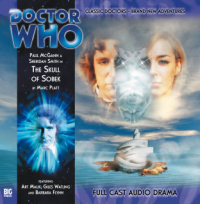

 |
'The Skull of Sobek' Released April 2008. 1 episode. Writer: Marc Platt |
Roots: Sobek was the crocodile god of the Egyptian pantheon (the Abbot's phrase "we have been weighed and found wanting" may be inspired by the Egyptian Book of the Dead). Peter Pan. Lucie mentions the Glastonbury Music Festival and calls Sister Chalice "Sister Sledge". The Doctor quotes from Coleridge's Rime of the Ancient Mariner ("water, water everywhere") The Name of the Rose, The Devils. Lucie's baiting of the Doctor as a "spineless fish" may be a reference to Paul McGann's title role in the legal series Fish.
Intertextuality: The Doctor's protest "I'm not anybody's champion!" may be a reference to the Virgin New Adventures theme of the Doctor (in particular the Seventh Doctor) being 'Time's Champion.'
Dialogue Triumphs: "Your tent broke my fall" "-Your fall broke my tent"
Dialogue Disasters: Some dreadful puns, particularly from Lucie: "Trigger-happy clappies"
"Lucie you do have some appalling habits" "Not as appalling as his habit - soaked through with water and blood"
And "Not unless you want to put the 'Lucie' into 'hallucination'"
Continuity: The Blue Desert is the most famous location on Indigo 3, resembling a slow blue sea of perfectly identical dunes. Seemingly everything, from Indigo3's moons to its inhabitants, is coloured a variation of blue; its people have eighty-three different words for the colour blue, and every 83 years, a torrential storm floods the desert and after a few days the whole region is carpeted with aquamarine flowers. The next storm isn't due for another twenty years. There are camels in the Blue Desert.
The Doctor says there are places in the Universe which come close to perfection. Due to the identical nature of the landscape the Blue Desert is a great attraction, bringing tourists from light years away. Isolated by the bewildering sameness of the dune desert is the Sanctuary of Imperfect Symmetry, a place of pilgrimage, devotion and deliberate disparity. Its deliberate asymmetry is itself an attraction during the stormy season, its adherents believing that too much perfection can be very dangerous. Pilgrims arrive by air coaches, and from as far as off world, leaving behind the trappings and attire of their former life, shaving their heads and adopting the habits of the Order.
The dead planet of Sobek was a wet and fertile planet with ten thousand year warrior culture ruled by a race of Crocodilians. Its weaponry (maces are among them) often embellished with crocodile imagery, such as snapping jaws. Its gilded palaces rose above the deep, rich waters and its princes drank 'flesh wine' (blood). The Doctor says Sobek was a world founded on centuries of slavery until the oppressed overthrew their tyrannical monarchy. The last fugitives from Sobek stole the planet's greatest treasure, the Great Skull, an artefact three hundred cubits long by thirty cubits high, and the repository of all knowledge of Sobek. The altar of the Skull lies below the royal swamp, with a wallow at the altar's front, and the cult of Sobek's bible The Triumphs of Sobek is at least nine chapters long, its final chapter being 'The Burning of the World.'. General Snabb has spent a hundred years scouring this sector of space in search of the Skull.
One human can sustain a crocodilian for a year
Lucie has been scared of crocodiles ever since she saw Peter Pan as a child, causing her to have nightmares about crocodiles climbing out of the cupboards or waiting under the bed.
Links: Dannahill mentions 'Galactic Fed' (The Curse of Peladon).
Location: Indigo 3 in the 'eastern arm' [of the Milky Way?] during the rule of the Galactic Federation.
The Bottom Line: "I refuse to be part of an old croc's race"
Somewhat squanders its celebrated guest cast (Art Malik and Barbara Flynn deserve better than this!) with a confusing and silly-sounding tale that struggles with its format. As a Platt story it's reliably fantastic in description, but the plot itself is routine and wears away quickly. Tick-tock, indeed.